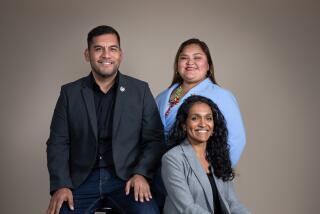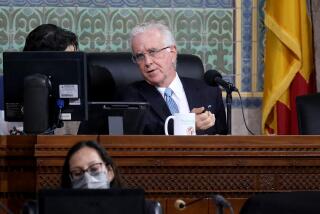Time Is Bringing New Council’s Aims Into Focus
- Share via
Four months ago, the city of Ventura braced itself for a major transformation. After one of the most expensive and hotly debated City Council elections in Ventura history, a landslide vote swept three environmental candidates into office.
County planner Todd Collart, League of Women Voters leader Cathy Bean and former world-class distance runner Gary Tuttle were elected with a strong mandate to slow down development and preserve the city’s natural resources.
They joined two incumbents elected in 1987 on similar platforms--the mayor, attorney Richard Francis and the vice mayor, anatomy professor Don Villeneuve to give slow-growth forces a clear majority in the city’s governing body for the first time since the mid 1970s.
Holdovers Jim Monahan, who came in a distant fourth in the November elections--and John McWherter found themselves in a minority for the first time in their long City Council careers.
As the new council enters its fifth month in office, this much is clear:
Leaders of the grass-roots movement that helped the new council members get elected are delighted with the new directions the city government appears to be taking.
“I think the average Venturan is finally being represented,” said John Middlebrook, a cabdriver and key member of the Alliance for Ventura’s Future, the group that was instrumental in the November election victories. “They are trusted servants who are carrying out their mandates.”
Business leaders, on the other hand, are as concerned as they were on election day that the new council’s anti-growth tendencies may ruin the city forever.
“Like any living organism, the city needs to develop and grow,” said Ventura Chamber of Commerce President Bob Gregorchuck. “Every city needs a tax base. But with this no-growth council, a couple of auto dealerships--our main source of sales tax--are leaving town already. And there are no more developer fees because of the building moratorium. Where is the money going to come from? Like they say, there’s no free lunch.”
But although some changes in the city have indeed taken place, both sides agree it is too early to make any final judgments. In fact, by all accounts the new council has not had the opportunity to develop an agenda or establish much of a track record because of two major policy issues.
First, the council had to deal with a water shortage emergency that hit the city just two weeks after the new members were sworn in. Last month the council adopted an unpopular, stringent water-rationing plan that includes a moratorium on new water hookups, thereby bringing all new development in the city to a standstill.
The most strident critics of the emergency measures were the Chamber of Commerce and the developers, who argued that the city was overreacting to the shortage and using it as an excuse to cut off development.
The other issue that keeps the council busy these days is the question of whether Ventura should allow the development of a Cal State University campus at Taylor Ranch, on the outskirts of the city. The debate is nearing a climax as the university moves forward with an environmental impact report on the site, the final step before construction begins.
Although a majority of the previous council supported the Taylor Ranch site, the new council is divided on whether the university should be built there and if so, under what conditions.
These issues have forced inexperienced council members into difficult decisions without the benefit of much time to learn their jobs.
Perhaps the biggest change in City Hall so far is the way the new council conducts business. Council meetings are longer and at times more confusing than in the past, city officials say.
Council members also spend more time in City Hall overseeing staff members and reviewing their decisions, key staff officials say. They add that council subcommittees are more active than in the past, and the city staff’s workload has increased significantly.
“They want to know the details, the actual mechanics of what goes into our decision-making process, especially on growth-related issues,” said City Planner Everett Millais. “Wanting to be educated is typical of all new councils. What’s different is the depth of detail these people want.”
Parks and Recreation Director Barbara Harrison agreed. “They are asking more questions, they really want the background,” she said. The council’s interest in the arts and the environment, Harrison said, has brought her department more publicity and more work than in the past.
She cites a new cultural arts program and a bike path study as examples. “This council really wants to make Ventura a better place to live in,” she said, “and we can help them do that.”
But there are some critics of the increased council supervision of staff members who view it as a sign of heavy-handedness, distrust and an inability on the part of new council members to delegate authority.
“Sure there are people who get frustrated,” City Manager John Baker said. “They’ve spent so much time operating in a certain way that they became comfortable, and now they have to change.”
The city’s Planning Commission, for one, has made it clear that it does not welcome what it perceives as interference from the council. At a recent commission meeting, its members blasted the council for telling them to turn down every single proposed new housing project because of the water shortage. The commission was not even consulted when the council adopted the moratorium on water hookups, commissioners complained.
“By telling us to simply deny all new development, we are left without the possibility of making any relevant input,” said Commissioner Gary Nasalroad, a candidate for council who lost in the past election. “We’re being left out of the loop.”
Nonsense, say the three new council members. They say they had to neglect the Planning Commission to deal with the recent water emergency, and promise to iron out differences as soon as they have time.
And most city officials have nothing to worry about, council members say--they have complete confidence in their abilities.
But there is one exception, Bean, Tuttle and Collart said. It is the Department of Public Works, which is responsible for providing an adequate water supply to the city.
“I really think that individually they are all top professionals,” Collart said. “But I can’t understand how they let the water problem fall through the cracks.”
Last month, at Tuttle’s request, the city commissioned an independent consultant--not staff members--to study short-term alternatives to deal with the water crisis.
“The city has a credibility problem when it comes to water, and I think justifiably so,” Tuttle said.
Adding fuel to the fire, Baker recently banned all of the city’s water officials from commenting on the water crisis, on grounds that these officials were making contradictory statements and that they were being distracted by the flood of interview requests from the media.
“I like the new policy just fine,” said Public Works Director Shelley Jones, who was allowed to comment for this story. “There have been some changes and we have to adjust.” He said it was a lack of rain last November, not his staff, that caused the water shortage.
In any case, their inordinate interest in city affairs should be viewed as a plus, council members say.
“We’re all over the place,” said Tuttle, “and maybe that’s just what the city needed--some goals, some plans, some real analysis. We don’t just rubber-stamp decisions from staff.”
That may be an understatement, if council meetings are any indication. Before the new council took office, meetings were quicker, more predictable and staff recommendations went unquestioned more often than not, Francis, Villeneuve and Monahan said.
The current council’s meetings sometimes turn into long, rambling discussions that last for hours and do not arrive at any specific conclusion. Public hearings are open, closed and reopened again. Motions are made, then amended, then the amendment is amended, and so on. In almost every meeting, after long debates, items are sent back to subcommittees for further review.
Not surprisingly, several meetings have ended past midnight.
Villeneuve sees nothing wrong with the way council meetings are now carried out. “The old council operated an old boys’ network. They all met in the downtown Lions Club, they traveled the same circles and no one questioned the subcommittees. It was an unstated rule that issues were resolved before the night of the vote.
“This council is raising a lot of questions, there are honest efforts to convince each other, minds are made up during the meetings and decisions are taken in front of the public.”
Francis, on the other hand, said he believes that the council’s reflective approach to issues is sometimes its biggest weakness. “I’m afraid we are falling into an analytical paralysis. Sometimes I wish we’d just go ahead and vote and get it over with.”
Monahan, a veteran of 15 years in the council, is even more blunt: “In the past, councils acted like professional bodies.”
If nothing else, the long meetings, which are televised on the local cable channel, have helped viewers identify the different council personalities that are beginning to emerge.
Tuttle has increasingly focused on problems of individual citizens. More often than not, he is singled out by residents for his accessibility and the efforts he puts into solving their problems, regardless of how small they may be.
“I think I’ve found my niche in council--it is dealing with individuals and their problems,” he said recently in his sportswear store, where he mixes sales pitches with city business. Blushing, he admits: “I kind of like it when they mention me in meetings.”
Francis, the lawyer, is well-versed in the art of building alliances. When faced with a proposal he dislikes and the prospect of a losing vote, he often proposes a compromise amendment that would make it worthwhile for him to be on the winning side.
“I have a sophisticated understanding of the political process,” he said, grinning, during an interview in his downtown office.
Unlike the rest of the first-term council members, he has moved away from the slow-growth camp to expand his support base by siding with Monahan and McWherter in favoring the Taylor Ranch site and a plan to import state water.
Bean’s obvious strength is her candor. When the council debate gets so confusing that no one can keep track of what’s being proposed, Bean invariably asks, “Could someone tell me what’s going on?” as her six colleagues breathe a collective sigh of relief.
Todd Collart, the top vote-getter in the 1989 election, is the most respected member of the council, according to several of his colleagues. His motions carry several votes--if not an outright majority--and his questions seem to capture his colleagues’ undivided attention.
McWherter is the least predictable of all the council members, fluctuating from slow-growth to pro-growth positions depending on the issues. Villeneuve, soft-spoken and understated, likes to keep a low profile, but has become a sort of elder statesman for the slow-growth faction.
And then there is Ventura’s most recent former mayor, who last year presided over a council that was accused of being too friendly toward developers. Today, now in the minority, Monahan sees himself as the conscience of the council.
Often the lone dissenter in council votes, he said he thrives on making motions that are bound to fail, but which expose the council’s bias against growth.
“I don’t mind being alone on the opposition,” he said. “I think it’s fun.”
More to Read
Sign up for Essential California
The most important California stories and recommendations in your inbox every morning.
You may occasionally receive promotional content from the Los Angeles Times.













